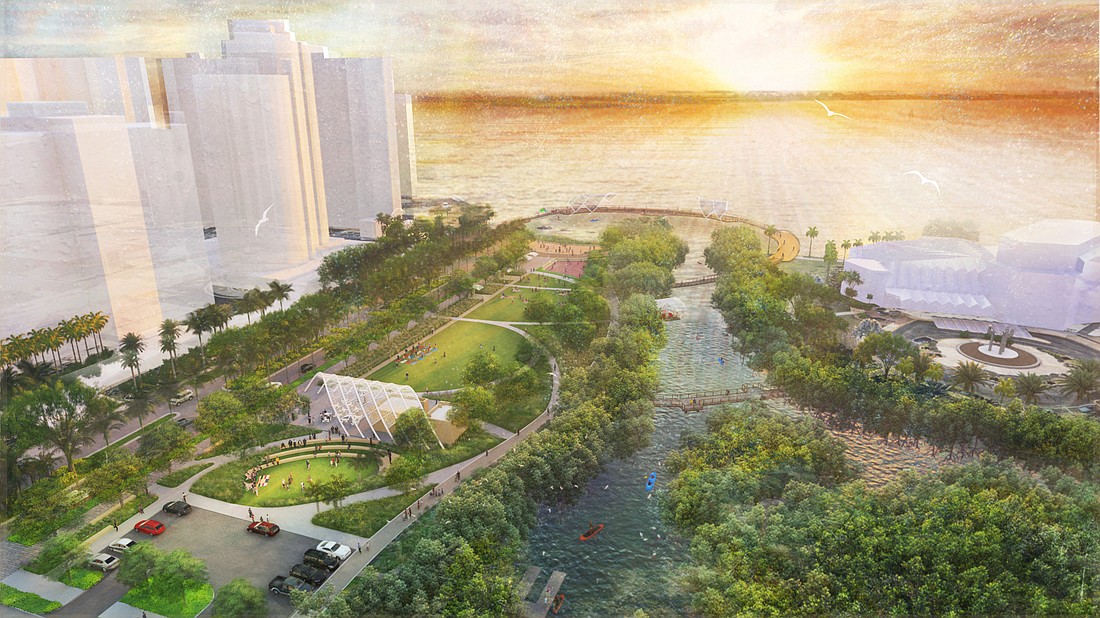- January 21, 2025
-
-
Loading

Loading

In 2019, one year after the city formally adopted a grassroots vision for redeveloping more than 50 acres of downtown waterfront land as a park, officials finalized an agreement with The Bay Park Conservancy, a private group formed to oversee the implementation of the plan.
At the time, the agreement included a review and approval process that created extra levels of oversight for the commission to track plans for the phase-by-phase construction of The Bay Sarasota project. In addition to a standard site plan, the conservancy would also have to submit separate plans for commission review that included preliminary design details and funding projections for construction and operations.
On Monday, The Bay Park Conservancy approached the city asking for a revised agreement that eliminated or altered some of that extra oversight. Although some in attendance at Monday’s meeting were wary of the proposed changes, the commission ultimately voted unanimously to approve the revised partnership agreement.
Representatives for the conservancy called the changes an opportunity to make the review process more efficient, saving time and money in the process of building out the park. Those representatives said the revisions sprung from years of partnership with the city, time that has given both parties more insight into how the collaborative process of redeveloping the bayfront should optimally work.
City officials who most strongly supported the revised agreement said they believed the conservancy had demonstrated its commitment to delivering a project built on robust community support.
“This is, at the end of the day, a park that I think we all have an alignment in our vision of what we want it to be,” City Commissioner Hagen Brody said.
Read more: The Bay chair shares project's vision
Read more: Mangrove Walkway opens
One of the most significant changes in the new partnership agreement is the elimination of a requirement to obtain City Commission approval of an “implementation plan” prior to submitting a standard site plan.
The Bay leadership said it took 18 months between obtaining approval for an implementation plan for the 10-acre initial phase of the park project and site plan approval for the same change. The Bay said it made minimal design adjustments over the course of those 18 months, but the delay cost the project team $1 million.
Based on that experience, The Bay estimated the revised partnership agreement could eliminate five to seven years from the buildout of the site while saving $20 million to $30 million in expenses.
Some speakers at Monday’s meeting objected to a proposal that would reduce the number of public hearings held on The Bay project while empowering the conservancy to assume new responsibilities, such as negotiating concession agreements with private companies.
City Commissioner Jen Ahearn-Koch said she was concerned about those changes as well, calling it a deviation from the philosophy that has been previously applied to The Bay.
“The whole time we’ve been talking about this … it’s constantly been said, ‘City Commission will have final approval, City Commission will have final approval.’” Ahearn-Koch said.
A.G. Lafley, the founding CEO of The Bay Park Conservancy, said the city would continue to maintain ultimate oversight on the future of the bayfront land. He said the new agreement primarily created more opportunities to handle things administratively, rather than going through the lengthier process of submitting plans or requests to the City Commission for approval.
Lafley and other conservancy officials noted The Bay would continue to have to comply with standard city land use regulations.
“Every decision in this implementation and partnership agreement is made by the city,” Lafley said. “The only thing that’s changed is relatively more of the decisions are made by the city manager or city management and staff.”
Mayor Erik Arroyo said he believed some of the concerns residents raised could be addressed even after adopting the new partnership agreement, encouraging staff and The Bay to seek opportunities to keep the public informed about how the project is progressing.
“It’s our responsibility as a community to decide and walk this very fine line between balancing saving time and creating efficiencies and saving dollars … while maintaining public involvement and [keeping] our community apprised of everything that’s happening,” Arroyo said.